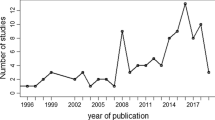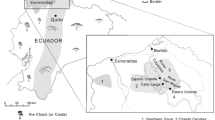Abstract
The oil palm tree (Elaeisguineensis) is widely grown in Nigeria and much of West and Central Africa. Aside from its edibility which enhances the body's immune system, its by-products are useful for a variety of purposes well beyond what was known in previous centuries. These by-products also serve as raw materials for the pharmaceutical and transportation industries. The massive production of oil palm trees also enhances green belt vegetation and therefore it is relevant for climate change mitigation. This chapter examines the modern economic potential of this plant and its prospect in the global sustainable development project. Data is drawn from the archives and other primary sources as well as necessary secondary materials that were reconstructed to fit into modern sustainable economic development.
Access this chapter
Tax calculation will be finalised at checkout
Purchases are for personal use only
Similar content being viewed by others
References
Allison, P.A. (1946). “The Collection of Export Produce in an Agricultural Economy.” Farm and Forest, vol. 7, No. 8. p. 12.
Britannica. (2020, September 12). Oil Palm Tree. Retrieved from Online Encyclopedia Britannica: https://www.britannica.com/plant/palm-tree.
Data Collected from Pharmacists Adah Okorie and Ekundayo Moses at Lokoja, Nigeria dated 20/05/2019.
Dike, K.O. (1956). Trade and Politics in the Niger Delta, 1830–1885. London: Oxford University Press.
Ekenta, C.M., Ajala, M.K., Akinola, M.O., & Oseni, Y. (2017). “Abandoned Nigerian Economic Resources: The Case of Oil Palm.” International Journal of Agricultural Extension and Rural Development Studies, vol. 4, No. 2, pp. 1–5.
Ford, D., and Scott, R. (1946). Native Economies of Nigeria. London: Faber and Faber.
Hopkings, A.G. (1973). An Economic History of West Africa. London: Longman.
International Institute of Agriculture, IIA. (1939). Oil and Fat: Production and International Trade, Studies of Principal Agricultural Products in the World Market, Nos. 4 and 5 (International Institute of Agriculture, Rome), p. 329.
Martin, A. (1956). The Oil Palm Economy of the Ibibio Farmer. Ibadan: University Press.
NIFOR. (2003). A Manual on Oil Palm Production. Nigerian Institute for Oil Palm Research (NIFOR), AMBIK Press Ltd.
NIFOR & FDA. (2005, May). Nigeria Oil Palm Production and Sustainability, Nigerian Institute for Oil Palm Research (NIFOR), in collaboration with the Federal Department of Agriculture (FDA).
Olufemi Adebola Koya. (2010). Harnessing Natural Resources for National Development. Unpublished International Seminar paper at Raw Materials Research and Development, Abuja, Nigeria, p. 5.
Ose, A., and Oboh, P. (2016). “Esan People, Our Culture, Our Faith.” Association of Uromi Diocese, ASUD Seminary of All Saints, Uhiele-Ekpoma, vol. 2, pp. 59–60.
Scholtz, T.W. (1964). Transforming Traditional Agriculture. Yale: University Press.
The Nigerian Tribune Newspaper. (2014, November 18, Tuesday). “FG Distributes 9 Million Palm Seedlings,” p. 16.
Tobback, L. (1944). “The Oil Palm in the Congo.” Belgian Review, p. 3.
Ukpabi, S.C. (1971). “Nnsuka Before the Establishment of the British Administration.” Odu: Ife Journal of West African Studies, no. 6, pp. 101–109.
Primary Sources
An in-depth interview with Abah Friday, 65 years, A Palm Oil Producer, at Oforachi, Nigeria, February 14, 2019.
An in-depth interview with Alhaji Okutepa, 38 years, Olowa Youth Leader, at Olowa, Nigeria, March 12, 2019.
An in-depth interview with Jeremiah Ichekwere, 72 years, Chief Priest of Obocho Lake, at Aniocha, Kogi State, Nigeria, September 28, 2019.
An in-depth interview with Kola Adeniyi, a Lecturer at the University of Ife, Nigeria, November 7, 2018, aged 50 years.
An in-depth interview with Olofu Abu, March 8, 2019, at Okpo, Nigeria. A palm wine producer, aged 60 years.
An in-depth interview with Pharm. Ada Ugonma at Federal Medical Center Lokoja, Nigeria. February 6, 2019, aged 36 years.
Interview with Abutu Eje, 74 years, Herbal Practitioner, at Oturkpo, Benue State, Nigeria, October 27, 2019.
Interview with Ocheja Elizabeth, 48 years, Health Worker and Liquid Soup Maker, at Idah, Nigeria, October 27, 2019.
Unanimous Oral data collected in Igala land, October 9, 2018.
Archival Materials
Lokoja/MANR/2722/5/120/3, The Igala Palm Products Production Scheme, District Officer Igala Division to Director Technical, NRPDB, 12/09/52.
National Archives Enugu, Nigeria. (1945). NAE/River Province (River Prof), 9/1/1173/DW/5187, Vol. 4, Confidential, oil Palm Production Officer Owerri Province to Resident Officer, 4/11/45.
National Archives Kaduna. Nigeria (1954). NAK/Dept. of Agric/617A/13, Igala Oil Mills, Agric Officer, Kabba Province to Resident Officer, Kabba Province, Lokoja 22/06/54.
National Archives Kaduna, Nigeria, NAK/Min. of Agric/32532/Vol. 1, Land and Agriculture.
National Archives Kaduna, Nigeria. (1953). NAK/Public Relations Department, Lagos Press Release, No. 69 of 10/11/53, Oil Produce Prices.
National Archives Enugu, Nigeria. (1931). August 13, NAE, RIVPROF 2/1/15, W.E. Hunt, Secretary, Southern Provinces to Firth.
National Archives Kaduna, Nigeria. (1936). NAK/NRPDB/PA/KA/1/36, Oil Palm Plantations in Igalaland, D.W.H. Baker Director of Operations to Regional Director of Agriculture, Kaduna.
Author information
Authors and Affiliations
Editor information
Editors and Affiliations
Rights and permissions
Copyright information
© 2022 The Author(s), under exclusive license to Springer Nature Switzerland AG
About this chapter
Cite this chapter
Achoba, F. (2022). An Analysis of the Importance of Oil Palm Tree in Central and Southern Nigeria. In: Wamboye, E.F., Fayissa, B. (eds) The Palgrave Handbook of Africa’s Economic Sectors. Palgrave Macmillan, Cham. https://doi.org/10.1007/978-3-030-75556-0_8
Download citation
DOI: https://doi.org/10.1007/978-3-030-75556-0_8
Published:
Publisher Name: Palgrave Macmillan, Cham
Print ISBN: 978-3-030-75555-3
Online ISBN: 978-3-030-75556-0
eBook Packages: Economics and FinanceEconomics and Finance (R0)




